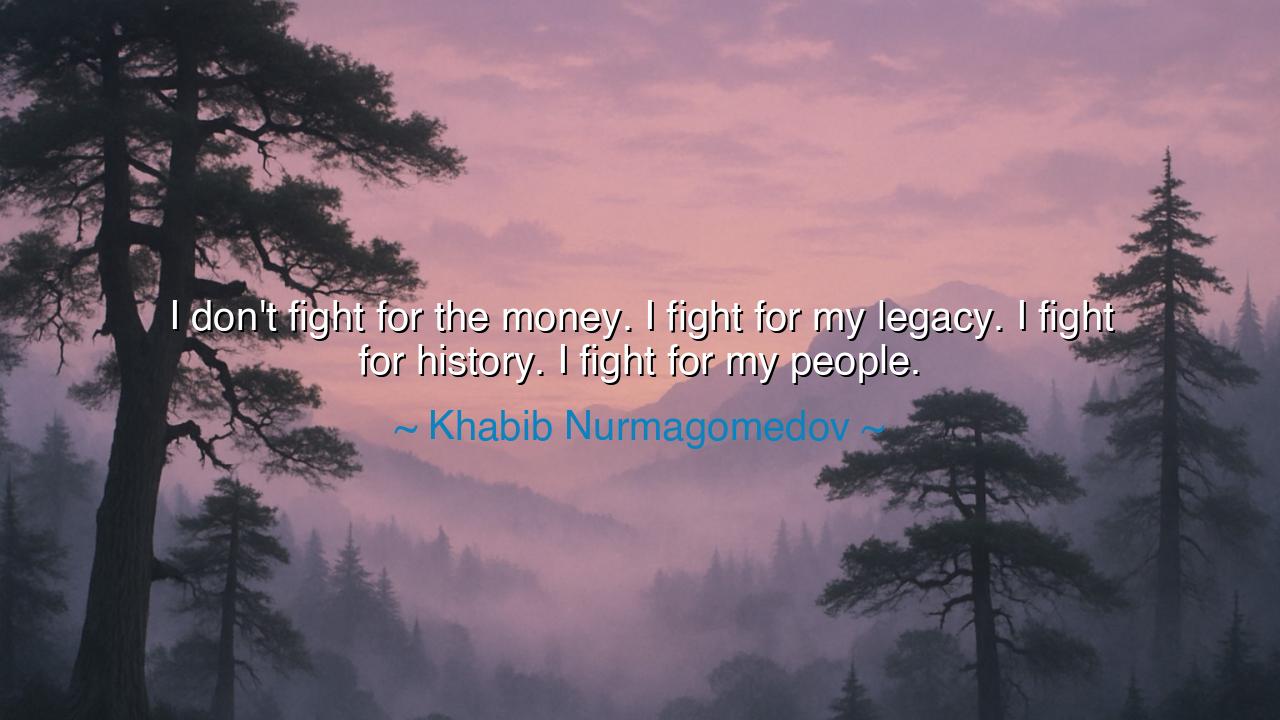
I don't fight for the money. I fight for my legacy. I fight for
I don't fight for the money. I fight for my legacy. I fight for history. I fight for my people.






In the fierce and noble words of Khabib Nurmagomedov, we hear the voice of a warrior who fights not for gold, but for glory: “I don’t fight for the money. I fight for my legacy. I fight for history. I fight for my people.” This is not merely the boast of a champion—it is the creed of a man who carries within him the spirit of his ancestors, the discipline of his faith, and the honor of his homeland. In these few words, Khabib reveals the ancient truth that purpose is the fire that burns longer than wealth, and that the true measure of greatness is not what a man gains, but what he gives to eternity.
The origin of this quote lies in the heart of Khabib’s journey—from the rugged mountains of Dagestan to the shining arenas of the world. Born into hardship and trained under his father’s unyielding discipline, Khabib was molded not only as a fighter but as a man of principle. His father, Abdulmanap Nurmagomedov, taught him that strength without humility is weakness, and that every victory must honor one’s people and one’s God. When Khabib stepped into the cage, he carried with him not the hunger of greed, but the burden of legacy—a duty to prove that the virtues of his culture—discipline, respect, and perseverance—could stand tall before the eyes of the world.
To say, “I fight for my legacy,” is to declare that fame is fleeting, but honor endures. Money vanishes, applause fades, but the story a man leaves behind lives forever in the hearts of those who remember. Khabib’s undefeated record—29 victories, 0 defeats—is not just a testament to his skill, but to his mastery of self. He fought not as a beast driven by anger, but as a guardian of tradition, guided by purpose and restraint. Even at the height of triumph, when the world clamored for more battles, he chose retirement after his father’s passing, honoring a promise made in love and grief. That act—of walking away when he could have gained the world—revealed more strength than any victory inside the cage.
Throughout history, there have been others who fought not for wealth, but for legacy. Consider Alexander the Great, who wept not for riches but for new worlds to conquer, seeking immortality through his deeds. Or Joan of Arc, who led armies not for payment, but for her faith and her people, giving her life to a vision greater than herself. Yet Khabib’s words are closer in spirit to those of the humble warrior-saints of the mountains—those who fight not to be remembered as conquerors, but to be remembered as men who stood firm when it mattered most. He reminds us that every person, in their own way, must fight their battles—with courage, with integrity, and with purpose.
The heart of Khabib’s message is identity. “I fight for my people,” he says—and in this, he speaks for all who carry their homeland in their hearts. To fight for one’s people is to understand that our victories are not our own, but belong to those who raised us, who believed in us, and who shaped us. When Khabib entered the arena draped in the papakha, the traditional hat of Dagestan, he brought his nation with him into the light. His every strike, every takedown, was not only for personal triumph—it was for the pride of a people who had long been unseen. To fight for one’s people is the purest form of service, for it turns every moment of glory into an offering of gratitude.
And yet, his words also hold a warning for this modern age—a time when many chase wealth without meaning, fame without virtue, and comfort without struggle. Khabib’s creed reminds us that discipline outlasts desire, and that those who serve only themselves will be forgotten, while those who serve others will live on in story and spirit. The ancient poets taught that a man dies twice—once when his heart stops beating, and again when his name is spoken no more. Those who fight for legacy and for truth conquer both deaths, for they live forever in the memory of mankind.
So, my children, hear the wisdom behind the warrior’s words: Do not live for gold—live for greatness. Whatever your calling—be it art, labor, or faith—do it not for applause, but for the honor of your craft. Let your actions speak of who you are and what you stand for. When you labor, labor with devotion; when you serve, serve with love; and when you fight—fight for something greater than yourself. For when the body grows old and the noise of the world falls silent, it is not wealth that will comfort you, but the knowledge that you lived with purpose, integrity, and heart.
In this way, Khabib’s words rise beyond the arena and become a lesson for every generation: True victory is not in defeating others, but in defeating the lesser self. To fight for one’s legacy is to fight for truth, for history, and for one’s people—and such a battle, waged with honor, never ends in loss.






AAdministratorAdministrator
Welcome, honored guests. Please leave a comment, we will respond soon